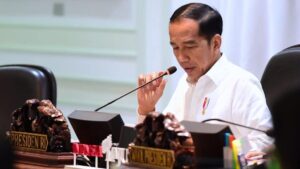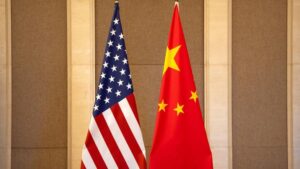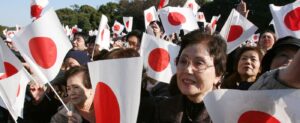The Identity Politics of World Cup 2022: a Tale Full of Expected Suprises

FIFA President Gianni Infantino (left) and Sheikh Tamim Bin Hamad Al Thani (right). Foto: JB Autissier/PanoramiC
To say that the identity politics we’ve seen in World Cup 2022 is merely about the revival of Islamic pride and identity might be an understatement because it’s also about how ‘The West’ are facing the fact that the prolonged liberal and western-based system now has reached the critical phase of its sustainability. The backlash against it was quite surprising yet, inevitable.
The global euphoria left after the World Cup in Qatar 2022 is undoubtedly enormous. The 64 matches of football that draws very close to a full-steamed worldwide celebration after the misery and uncertainty brought by the Covid Pandemic outstandingly concluded with — if not the best — one of the most thrilling and surprising campaigns of sport which we will cherish for our entire life. However, the impression left by the 2022 WC is slightly or entirely different for the western — or in a more thorough perspective I should say for those who subscribe totally or partially to the liberal way of living as well. To that end, I believe I can agree with those who were watching every match of the 2022 WC on two things. Firstly, we were witnessing a very entertaining showdown of tactics on the football field. Secondly, we were also witnessing the competition which happened off the football field, namely the value and norms competition. Through a horse eye, some might narrowly associate Islamism as the center of discussion, but I believe we can sense something bigger than a religious-based campaign.
With the anti-LGBT campaign, the mainstreaming of Arabic customs, and the rendition of Quran verses one can barely count the cultural attributes that were presented in WC 2022 with just one hand. As it happened to be held in Qatar (one of the most developed Arab countries today), indeed the display of Islamic symbols might seem predicted at first since the use the cultural symbols and traditions commonly appears everywhere in every modern sports event across the world. As for the world cup, we probably would not imagine any differences from the 2010 World Cup in South Africa cause at the end of the day, the performance of local cultures is no more than just a “tourist attraction”, “a romanticizing of black and other non-white cultures”, or “an exotification of the indigenous”.
However, the Qatar edition of world cup succeeds to spread a fresh and noteworthy “illiberal movement” within the football stage which for some time has become the strong platform for liberal ideas of anti-discriminative and egalitarianism that are mainly displayed in the European major leagues. Since football has become more and more political, I believe the use of “identity politics” here is acceptable. Emphasizing identity politics seems necessary to help us understand deeper the competition of identity discourses which happened in Qatar.
The public discourse that emerged afterward no longer goes perfectly in a meta-narrative of liberal multiculturalism’s way but rather goes as a collective backlash against the western norms especially within the Arab Countries. We can see the pride of being a “non-liberal” appears unambiguously and explicitly, ranging from the hesitant of a few countries to wear a rainbow-colored armband during the match to the press release of Giovanni Infantino, the President of FIFA that boldly stated his support of forbidding beer sales around the stadium. By explaining that, I would like to show that this sort of illiberal gesture is done by multiple actors — not exclusively driven only by Islamic ideas. Nevertheless, the collective consensus upon the disagreement of LGBTQ and any form of liberal-based values campaigns is often understood as a religious-based backlash while it might resemble a bigger sign, the critical juncture of “Cold War-inherited” liberalism.
The important fact which is very much diluted by the overwhelming “Islam vs West” narrative was the disappointment, dissatisfaction, and even anger toward the status quo. This collective resentment once had been buried away until it finally gained momentum here in Qatar. We could finally see how remote the liberal values are, how exclusive they are, and how strange they are for the entire community beyond their “circle of civilization”.
I immediately asked myself after seeing all of this happen. Does it bring any surprises? does it represent a brand-new identity campaign? and here goes the most fundamental question, do we need to be surprised? Again, the resistance to this liberal backlash has been happening if not everywhere, in a lot of places. The rise of China, the Russian’s invasion of Ukraine, etc. are few of those cases where “illiberalism is confidently performed”. Some even see the identity discourses during WC 2022 remarks as a significant postcolonial gesture considering the lack of global support for the western-supported LGBTQ campaign at least from south countries — apart from the success of Morocco in reaching the semi-final.
As Fukuyama stated in his 2018 book “The Demand of Dignity”, the feeling of resentment circulating within the grassroots is creeping through many aspects of societies and political campaigns might be best suited to such a process. To some extent, identity politics becomes a very potential platform for voicing and advocating the rights of marginalized communities but, the worst case that could happen — as we already have seen — is the very extreme forms of identity backlash, fascism for example. Thus, I believe the resentment that is happening—which is accommodated by the Qatar WC 2022—has been stacked for a very long time because western liberalism has failed to speak through a language of universality, and ended up excluding some and entertaining few. In terms of economics, this sort of ideal universality—or equality—has long gone ended up as a platitude, and now seems this has also spilled onto the sociocultural field.
Chance after chance has been wasted by the architect of liberal order to prove its capability to produce an egalitarian and inclusive system especially in helping vulnerable groups, such as women, LGBTQIA+, queer, migrant workers, indigenous people, etc. both socially and economically. The white liberal feminists are too busy campaigning about “body authorities” not realizing the fact that the struggles experienced by black, latinos, and working-class women might differ from them, the human rights defender often overlooks the rights of indigenous people, and the western countries keep severely stigmatizing Islam with terrorism. It’s indeed not the end of the world but in my opinion, the universality has certainly failed to be achieved and the west is no other the victim of their own crime. It’s not just about norms competition, the worst thing about it is we fail to represent the voice of the voiceless.
Now we have to put a big question mark after the recent development — to be specific, regarding how the west responds to the hinder they find themselves in. Trump in the US, Brexit in the UK, and recent developments of xenophobia, racism, and islamophobia towards migrants in other parts of Western Europe have finally brought us to the question, “who’s going to step up and save liberal democracy cause even the architect who constructed the building is no longer sure that its foundation is strong enough?” or even worse, “the architect him/herself finally taking the bricks out of the wall one by one until it collapses. The whole explanation finally brings me to a conclusion, international politics are entering a new phase where the claim of objectivity and universalism brought by liberalism are being challenged by subjectivity and relativity of local cultures. Thus, we must prepare for more because what happened in Qatar was only the tip of the iceberg.
Gibraltar Andibya Muhammad is a student at Universitas Indonesia. He can be found on Instagram with username @gibraldiboy





